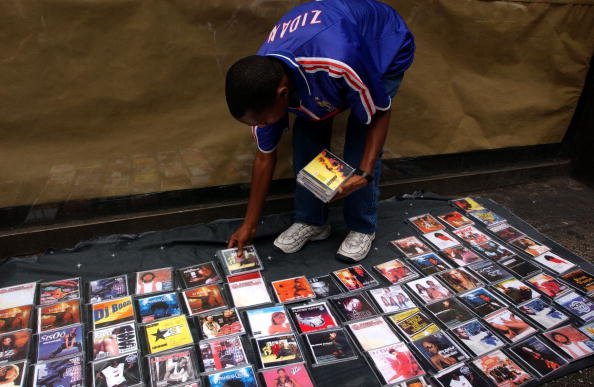There seems to be this mistaken idea floating about the Pagan community that the written word is “free”. Literally almost every two weeks somebody on Facebook posts another warning and call to action regarding theft of intellectual property. Part of this may be because plagiarism and piracy is so common in our sacred literature. Gardner ripped off Crowley and Leland, and today people pass along rituals, poetry and texts without regard for it’s origin or author. While I don’t think it’s merely a Pagan problem (I’m certain Sunday school teachers and choir leaders may face the same issues) I do think it’s a problem that we treat things of spiritual worth as if they have no mundane value.
 This morning I saw once again people warning against DarkBooks.org, where you can download occult and Pagan books for “free” with a “donation”. Though site owner Christina Debes claims “on my site you can download and order on CD only PUBLIC DOMAIN versions of books“, she also lists as available for download Pagan Christianity, a book by Christian authors calling from the removal of Pagan practices from the church. The Amazon listing for the book allows you to look inside and read the copyright notice, as anyone scanning the book into a downloadable format would have also seen. Despite this being a newer book with a clear copyright this book is listed as available for a “free” download with “donation”. On the page where the book is listed as available for “free” download and records 17 recent downloads we are assured by Ms. Debes: “I am very attentive to the issue of copyright and try to avoid any violations, but on the other hand to help all fans of magic to get access to information.”
This morning I saw once again people warning against DarkBooks.org, where you can download occult and Pagan books for “free” with a “donation”. Though site owner Christina Debes claims “on my site you can download and order on CD only PUBLIC DOMAIN versions of books“, she also lists as available for download Pagan Christianity, a book by Christian authors calling from the removal of Pagan practices from the church. The Amazon listing for the book allows you to look inside and read the copyright notice, as anyone scanning the book into a downloadable format would have also seen. Despite this being a newer book with a clear copyright this book is listed as available for a “free” download with “donation”. On the page where the book is listed as available for “free” download and records 17 recent downloads we are assured by Ms. Debes: “I am very attentive to the issue of copyright and try to avoid any violations, but on the other hand to help all fans of magic to get access to information.”
While Ms. Debes’ site is what currently has Pagan authors up in arms, it’s certainly not the first and won’t be the last. Not so long ago a Facebook group began posting the work of well-known Pagan authors as their own work until community pressure was brought to bear. Just a few months ago a non-Pagan print magazine folded after receiving heat for plagiarism and theft. Being free with other people’s work has become an epidemic. Pagan musicians are losing hard-earned revenue to piracy. Pagan artists spend far too much time dealing with theft of their work by “free clip art” sites. Pagan publishers and authors who work hard to midwife new books into being are exasperated by how quickly their hard work is undermined by people posting illegal downloads.
I won’t claim to be a saint. I was quite a pirate back in the day. It took awhile before I realized that it wasn’t Metallica I was hurting but artists I truly love. Pagan authors, artists and musicians aren’t wealthy from their creative work. They generally have regular jobs like everyone else. They spend their “time-off” working on their craft as well as their Craft, and generally make very little from it. In the case of musicians and visual artists, they don’t simply invest their time but also their resources. Pencils and microphones don’t pay for themselves. This isn’t to diminish the time they spend. If anyone could pick up a guitar and sound like Damh the Bard, Chris Bingham, SJ Tucker or Celia then we wouldn’t value their music so much. If we could draw like Jessica Galbreth or carve like Paul Borda, we wouldn’t be such fans of their work.
One author and tradition has taken a unique approach to the problem of theft. For a long time I couldn’t comprehend why Andrew D Chumbley and Daniel A. Shulke, of the Cultus Sabbati, charge so much for their high-quality limited edition books. Right now a used copy of The Azoetia will run you a cool $1,299 on Amazon and a new copy of Ars Philtron is currently $250. Surely an author wants their work read widely? Maybe not. Cultus Sabbati books are certainly widely available for illegal download. Their work is sold initially through their website and they restrict who is allowed to purchase their books from them, which is why the supply and demand on Amazon has reached such heights. Just as old grimoires and Books of Shadows are full of blinds so that theft is easily detected by the thief’s lack of comprehension and oral “keys”, so I’m sure the Cultus Sabbati books are the same way. I wouldn’t be surprised if they expect their students to prove they are in possession of physical books before considering teaching them their Craft.
Of course, the Cultus Sabbati model cannot work for Scarlet Imprint or Neos Alexandria. For one, the capital required to begin such an endeavor must be significant and the product must be suitably obscure. Not every Pagan author, artist or musician can control their creative output with such an iron grip and hope to thrive. What we can learn from Cultus Sabbati is that Pagan intellectual property demands respect, and a large part of that respect is paying the artist the price they name. Wiccan laws forbid haggling over anything sacred and I’m trying to take that deadly seriously in my life now. If I value the product of an artist then I need to show the artist respect, by valuing the worth of their time, resources, materials and creativity. I especially need their consent to obtain and use their materials. I hope you agree.















